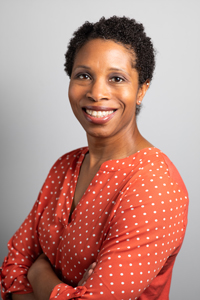Alumni Spotlight: Brandy Williams
Brandy Williams, MSW 2019
Director of Education, Metropolitan Organization to Counter Sexual Assault (MOCSA)
Brandy Williams graduated with a Master of Social Work (MSW) with a macro specialization in 2019. Today, she works as the education director for the Metropolitan Organization to Counter Sexual Assault (MOCSA) in Kansas City.
 Williams advises aspiring social workers to be well-rounded and not confine yourself to just clinical or just macro social work.
Williams advises aspiring social workers to be well-rounded and not confine yourself to just clinical or just macro social work.
“You're not just going to be a clinical therapist, and you're not just going to be a macro social worker. There's a lot of intertwining because you have to be able to relate to people,” Williams said.
Williams currently handles her department’s budgets and uses skills from KU MSW classes to help her with work.
“It's really empowering to be able to know how to guide your programs by seeing how the budget is laid out,” Williams said.
Williams shared her experience with KU’s MSW macro specialization program for a Q&A.
Video editing and graphics by Lizbeth Villanueva
Q&A with Brandy Williams
What drew you to macro social work?
I felt that with macro social work, I could use the skills that I developed doing a lot of direct, client-centered work, to then work with systems.
… Programs that felt effective for the children and families that I have been working with, evaluating those programs, and to most importantly, have those programs be led by data from my own experiences, but also from the community directly.
And I think that after hearing and meeting other people that were in the macro program at KU, around the same time I was trying to decide, it just solidified what I wanted to do.
What’s the most rewarding part of macro social work?
I think it's versatile. I don't think people understand how versatile it is, because you can also bring other skills you have to increase the understanding of what macro means – for example, relational skills.
You have to be able to communicate with people. You have to be able to get that community buy-in … in order to get to the next step.
I think that it’s pretty awesome that you're able to pull in other people to see your vision and then help you implement it.
How has your KU MSW degree played a role in equipping you for your work today?
I heard lots of people say that when they were in college, a lot of what they learned didn't help when they got to whatever job they were doing. I feel like that's the exact opposite for me. … At the time, I was like, "I don't really understand how these fit," but it totally made sense after being in the macro program for the couple of years.
… I have to manage my own department's budgets and we have a lot of federal and state grants, as well as private grants. I make sure that we are spending our money in the way we said we would. I have to take note of, "Hmm, maybe we don't need this much money for printing. How can this money be used better?"
… I think people are kind of scared to learn about those things. It's really empowering to know how to guide your programs.
What should aspiring social workers know about macro practice?
It's amazing, and that it's not just one thing, right?
You're not just going to be a clinical therapist, and you're not just going to be a macro social worker. There's a lot of intertwining because, again, you have to be able to relate to people.
I think that macro level social work is versatile. It’s fun, it's something that makes you think, and it's this ability to be able to say, "Wait, this isn't working, how can we make this work differently?"
This article is part of a Q&A series featuring KU Master of Social Work graduates who completed a specialization in social work macro practice. Learn more about the master's degree program on the Master of Social Work program overview page.